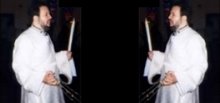
So, while we just left the leave-taking of Theophany
last Sunday,
Zacchaeus comes to us
this Sunday, and in just over a week, we crack open the Lenten Triodion and begin the long journey to Pascha.
Every year, I think of posting the article I wrote five years ago on
The History of Our Salvation: Reading the Old Testament During Lent and Holy Week -- usually I think of it during Holy Week.
This year, I figured I'd get a jump on it. Better late than never -- but better early than late!
I hope you enjoy and find it useful. I seem to recall, just after I'd written it, noticing that I'd left a couple of services/readings out. If you find something missing,
please let me know, and I'll update the paper and credit you as a contributor!
A blessed Pre-Lent to you all --
The History of Our Salvation: Reading the Old Testament During Lent and Holy Week
O almighty Master, who hast made all creation and by thine inexpressible providence and great goodness hast brought us to these all-revered days, for the purification of soul and body, for the controlling of passions and for hope of resurrection, who, during the forty days didst give into the hands of thy servant Moses the tablets of the Law in characters divinely traced by thee: Enable us also, O good One, to fight the good fight, to complete the course of the fast, to preserve inviolate the faith, to crush under foot the heads of invisible serpents, to be accounted victors over sin; and, uncondemned, to attain unto and worship the holy resurrection. For blessed and glorified is thine all-honorable and majestic name of the Father and of the Son and of the Holy Spirit, now and ever, and unto ages of ages.
-- Antiochian Orthodox Christian Archdiocese of North America, The Liturgikon: The Book of Divine Services for the Priest and Deacon (Englewood, New Jersey: Antakya Press, 1989), pp. 370-371.
From the first Presanctified Liturgy of the Lenten season, the Old Testament is offered to us for instruction and inspiration, and revealed to us as our guide through the forty days-those forty days which we keep in memory of Moses' sojourn on Mount Sinai, during which God gave into the hands of His servant the tablets of the Law in characters which He Himself divinely traced. This is, of course, a reference from the Book of Exodus. The second Old Testament citation in this prayer hearkens from the earliest chapters of the Book of Genesis, in which God curses the serpent who has just led Adam and Eve into temptation:
On your belly you shall go, and you shall eat dust all the days of your life. And I will put enmity between you and the woman, and between your seed and her Seed; He shall bruise your head, and you shall bruise His heel.
And on Holy Saturday itself-the final day of Holy Week and the very eve of Pascha-at Lauds and again at the Vesperal Liturgy, it is "The Great" Moses himself, the central figure of the Old Testament, who reveals to us the meaning of this great day, as we sing in the doxastikon:
Moses the great mystically prefigured this present day, saying: "And God blessed the seventh day." For this is the blessed Sabbath, this is the day of rest, on which the only-begotten Son of God rested from all His works. Suffering death in accordance with the plan of salvation, He kept the Sabbath in the flesh; and returning once again to what He was, through His Resurrection He has granted us eternal life, For He alone is good and loves mankind.
-- Mother Mary and Archimandrite Kallistos Ware, translators, The Lenten Triodion (London, England: Faber and Faber, 1978), pp. 652-653, 656.
It is no accident that the central figure of the Old Testament, Moses, and the central events of the Old Testament, the exodus from Egypt, the giving of the Law on Mt. Sinai, and the Israelites' forty year pilgrimage in the desert, frame for us our forty day pilgrimage to Pascha.
Bishop Kallistos of Diokleia describes Great Lent as "an
annual return to our Biblical roots. It is, more specifically, a return to our roots in the
Old Testament; for during Lent, to a far greater degree than at any other time of the year, the Scriptural readings are taken from the Old Testament rather than the New." (
Ibid., p. 38.)
Alexander Schmemann, of thrice-blessed memory, goes even further:
One can say that the forty days of Lent are, in a way, the return of the Church into the spiritual situation of the Old Testament-the time before Christ, the time of repentance and expectation, the time of the "history of salvation" moving toward its fulfillment in Christ. This return is necessary because even though we belong to the time after Christ, and know Him and have been "baptized into Him," we constantly fall away from the new life received from Him, and this means lapse again into the "old" time. The Church, on the one hand, is already "at home" for she is the "grace of Jesus Christ, the love of God the Father, and the communion of the Holy Spirit"; yet, on the other hand, she is also "on her way" as the pilgrimage-long and difficult-toward the fulfillment of all things in God, the return of Christ and the end of all time.
Great Lent is the season when this second aspect of the Church, of her life as expectation and journey, is being actualized. It is here, therefore, that the Old Testament acquires its whole significance: as the book not only of the prophecies which have been fulfilled, but of man and the entire creation "on their way" to the Kingdom of God
-- Schmemann, Alexander, Great Lent (Crestwood, New York: St. Vladimir's Seminary Press, 1974), pp. 38-39.
And so as we go on
our way to the great feast of Pascha, the Old Testament is our book, our guide, and our constant companion.
[READ IT ALL]
 So, on the one hand, if we "stay the course" in Iraq, "surging" the number of troops on the ground, we simply (continue to) try to put out the fire by pouring gasoline on it. The Iraqis don't want us there, they regard us as an occupying rather than a liberating force, and our very presence is incendiary. A bigger presence only fuels a bigger flame.
So, on the one hand, if we "stay the course" in Iraq, "surging" the number of troops on the ground, we simply (continue to) try to put out the fire by pouring gasoline on it. The Iraqis don't want us there, they regard us as an occupying rather than a liberating force, and our very presence is incendiary. A bigger presence only fuels a bigger flame.


